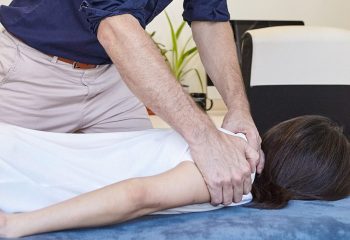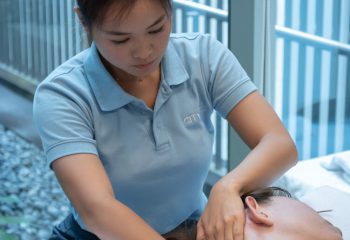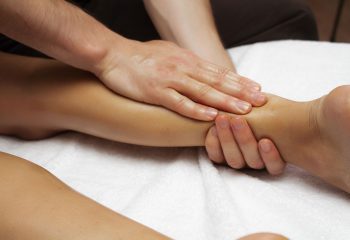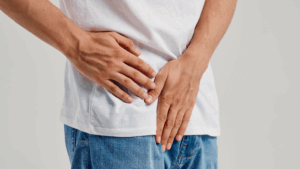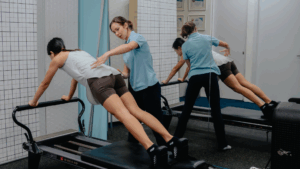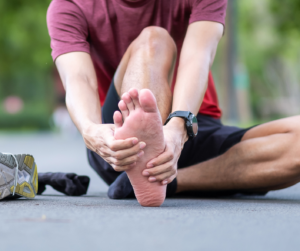Why Safe Baby Toys Matter for Your Child’s Development
In your baby’s first year, play isn’t just about fun — it’s essential for healthy development. One of the earliest ways infants explore the world is through mouthing. Whether it’s a plush toy, teether, or rattle, babies use their mouths to soothe discomfort, stimulate their senses, and begin developing motor and cognitive skills.
But not all toys are created equal.
At City Osteopathy & Physiotherapy, we support families by helping their little ones grow, move, and develop confidently. And that includes helping parents make safer choices — especially during the teething and mouthing stage, where toy safety becomes crucial.
More Than a Habit: The Role of Mouthing in Early Development
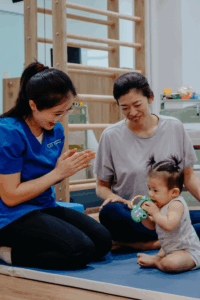
Mouthing is a natural reflex in babies — and an important part of oral motor development. It supports:
- Sensory exploration (texture, shape, temperature)
- Soothing of teething discomfort
- Coordination of jaw, tongue, and lip movements
- Hand-to-mouth coordination, which builds fine motor control and prepares for independent feeding
- Understanding cause and effect – learning how pressure and movement change what they feel in the mouth
- Neuromuscular preparation for solid foods, helping develop safe chewing and swallowing patterns
But these benefits can be compromised if the toys used are not safe. Poorly made or unregulated baby toys may contain small parts, harmful chemicals, or materials that irritate the mouth and gums — potentially delaying progress in early milestones.
What to Look for When Buying Baby Toys in Singapore
While Singapore has high safety standards, the reality is many toys available online or from overseas sellers may not meet them. Here’s how you can choose safer toys for babies — especially those under 12 months.
✅ Look for Certified Safety Standards When Buying Baby Toys
Always check for labels and certifications that guarantee the toy has been tested for safety and toxicity.
Certification |
What It Means |
|---|---|
Singapore Safety Mark |
Indicates the product meets local safety regulations set by Enterprise Singapore |
EN71 |
European standard for toy safety — ensures the toy is non-toxic, mechanically safe |
ASTM F963 |
US safety standard for toy testing — includes flammability and chemical composition |
CPSIA |
US law ensuring lead, phthalates, and heavy metals are below set limits |
💡Always check for these labels on packaging or the product page. If they’re missing or vague, that’s a red flag.
Safe Toy Choices for 0–6 Month Olds
During these early months, your baby is developing visual focus, grip reflexes, and oral motor skills. The right toys can support that — while keeping them safe from injury or exposure.
Toy Type |
Developmental Support |
Safety Tips |
|---|---|---|
High-Contrast Soft Toys |
Boosts visual tracking and focus | Choose bold, simple patterns; avoid rigid plastic components |
Silicone Teethers |
Soothes gums and supports jaw movement | Ensure it’s 100% food-grade and BPA-free |
Soft Rattles |
Encourages grasping and sensory exploration | Look for sealed designs without detachable parts |
Bath Toys |
Stimulates tactile learning and comfort with water | Pick mould-resistant options; avoid water-trapping holes |
Cloth Books |
Combines bonding, touch, and early language cues | Go for chew-safe, machine-washable materials |
Want to understand which milestones your little one should be reaching in these early months? Explore our Developmental Milestones Guide for 0–4 Month Olds to learn more about what’s typical — and how you can support healthy growth from the very beginning.
For Babies 6 Months and Up: Safe Toys for Teething and Active Play
As your baby starts sitting up, grasping firmly, and reaching out more, toy choices should evolve to support greater movement and coordination — while still protecting their gums and oral tissues.
Recommended toys for this stage:
- Chillable Silicone Teething Rings – for gum relief
- Soft Stacking Rings – improves hand-eye coordination
- Textured Balls – stimulates grip and bite-safe
- Vibrating Teethers – encourages oral motor activity
Tip: Always inspect toys for wear and wash them regularly to prevent bacterial build-up.
Curious about how your baby should be progressing at this stage? Discover key milestones and how to support their development in our Developmental Milestones Guide for 4–7 Month Olds. It’s a great way to stay informed and confident as your little one grows more active.
Teething Toys: How to Choose the Right One
Teething usually starts between 4–6 months and can be a challenging period. A good teething toy can help ease discomfort and support healthy oral muscle activity.
Here’s what to look for:
- Textured surfaces – to gently massage gums
- Free of gels or liquids – these can leak or spoil
- No sharp or hard edges – to avoid gum trauma
- Steriliser-safe or dishwasher-safe – for easy cleaning
Avoid wood or painted toys unless specifically labelled baby-safe, as these can splinter or absorb saliva, harbouring bacteria.
Are Toy Cars and Dolls Safe for Teething Babies?
Toys like baby cars and dolls are great for imaginative play — but they can also end up in the mouth. Here’s how to make safer choices:
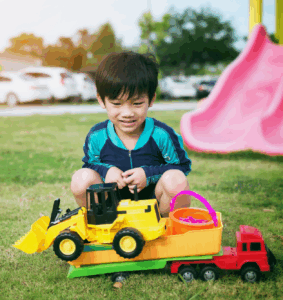
Baby Toy Cars
Baby toy cars are more than just mini vehicles — they’re sensory and motor skill boosters. But when your baby’s first instinct is to bite everything, toy cars need to be carefully chosen.
- Choose chew-safe materials like silicone or soft plastic
- Avoid detachable parts (like wheels) that pose a choking hazard
- Stay away from metal or rigid plastic which may cause injury
- Inspect regularly for cracks or loose parts
Even if your child prefers to push or carry the toy, remember: if it fits in their hand, it will probably end up in their mouth too.
Baby Doll Toys
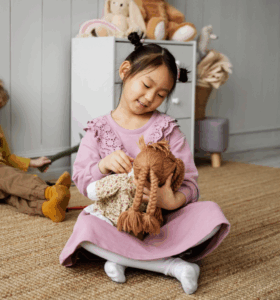
Baby dolls are wonderful for developing empathy and imagination. But in the early months, their safety depends on the details.
- Go for plush, fabric dolls with embroidered features
- Skip glued accessories or button eyes
- Check seams and limbs to ensure durability
- Wash often — these toys are often hugged, licked, and chewed
Whether they’re being hugged, dragged along the floor, or chewed during teething — baby dolls must be as safe as they are lovable.
Baby-Safe Paints: Not Just a Detail
Paint safety is critical, especially for teething babies. If a toy is painted but not labelled baby-safe, there’s no guarantee it’s free from harmful substances like lead or cadmium.
Safer Paint Options for Baby Toys:
Paint Type |
Why It’s Safe |
Best Practice |
|---|---|---|
Water-Based Paint |
Low VOCs, odour-free, non-toxic | Used in many baby-safe wooden toys |
Non-Toxic Label |
Tested for oral safety | Look for certifications (EN71, ASTM F963) |
Food-Grade Paints |
Approved for oral contact | Buy only from reputable manufacturers |
When in doubt — skip unlabelled or decorative toys, especially for babies under 1 year.
Supporting Healthy Baby Development from the Start
At City Osteopathy & Physiotherapy, we offer a Developmental Milestones Assessment for Babies — a comprehensive service designed to support parents in understanding their baby’s physical, neurological, and sensory development.
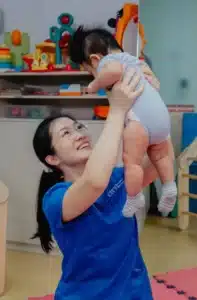
Our therapists are trained to identify subtle delays or challenges in areas like:
- Motor coordination
- Muscle tone and posture
- Head and neck control
- Reflex integration
- Oral-motor skills, including mouthing and feeding
We work closely with parents to provide personalised care plans, and where needed, gentle early intervention to help babies move confidently toward their next milestones.
If you’ve noticed changes in your baby’s mouthing behaviour or have concerns about their development, we’re here to help.
Final Thoughts: Choosing Baby Toys that Support Development
Your baby’s playtime is a foundation for movement, learning, and emotional bonding. Choosing safe, high-quality toys not only protects them from harm but also supports healthy oral and motor development from day one.
At City Osteopathy & Physiotherapy, our team supports families through every stage of childhood development — from teething to crawling, sitting, and walking. If you’re ever unsure whether your child’s toys are helping or hindering their progress, our physiotherapists are here to guide you.
Need support with your baby’s development or motor milestones?


